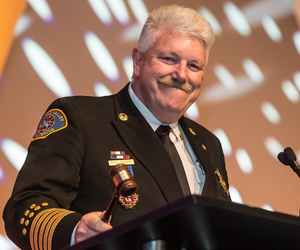
A new law that would protect first responders in the event of a terrorist attack using anthrax drew strong support from the International Association of Fire Chiefs (IAFC).
The First Responder Anthrax Preparedness Act requires the Department of Homeland Security to carry out a five-year pilot program to make anthrax vaccines available to emergency response providers who are at high risk of exposure to anthrax, a naturally occurring toxin. President Barack Obama signed the legislation into law last week.
First responders who volunteer would be supplied with surplus anthrax vaccines that would soon be expiring from the Strategic National Stockpile.
“The best way to mitigate a first responder’s potential for ill effect or death to anthrax is to get vaccinated for it,” Chief John Sinclair, IAFC president, told Homeland Preparedness News in an interview.
Many first responders will be interested in getting vaccinated, particularly those in higher-risk urban areas like Washington D.C. and New York, he said.
An anthrax attack has not occurred in the United States since September 2001, but the development of anthrax as a biological weapon by several foreign countries has been documented.
Following the 9/11 terrorist attacks, letters containing anthrax spores were mailed to several news media offices and two U.S. Senate offices, killing five people and infecting 17 others in what became the worst biological attacks in U.S. history.
“From a bioweapons perspective, we know a lot of countries have the capability of growing anthrax and being able to weaponize it,” said Sinclair, who also serves as the fire chief of Kittitas Valley Fire and Rescue and emergency manager for the City of Ellensburg in Washington.
Offering anthrax vaccines to police, fire and emergency medical services is a logical step, given that the military already has an active vaccination program against anthrax for personnel going to specific parts of the world.
Another top legislative priority of the IAFC also was signed into law earlier this month. The National Urban Search and Rescue Response System Act strengthens the efficiency and effectiveness of Federal Emergency Management Agency’s disaster assistance capabilities and programs.
The law clarifies existing workers’ compensation and liability protections, allows for death and disability benefits and the ability of federal volunteers to have reemployment rights.
The law will “take care of occupational health and safety issues so that families of those team members don’t have to worry that if their first responder is hurt in the line of duty and are away from their home agency, who pays for that?” Sinclair said.
The IAFC also is looking ahead to the future deployment of a nationwide broadband network for public safety by the First Responder Network Authority (FirstNet).
Commercial networks can become slow or spotty during emergencies, but FirstNet aims to improve interoperability across agencies by providing the ability to send high-speed data, location information, images, and video on a secure, dedicated network.
FirstNet will initially be used for transmitting data and will not immediately replace the land mobile radio that public safety personnel use for communication.
Firefighters need the ability to instantly download information in emergencies, whether it’s a building plan, a manifest on a railroad, or research on hazardous materials.
“I am going to be making decisions in the command post that will affect people’s lives. I could very well be putting people in danger,” Sinclair said. “The more information that I can have, the better off we are.”




